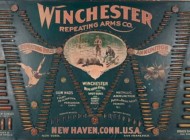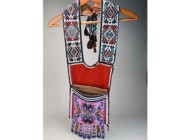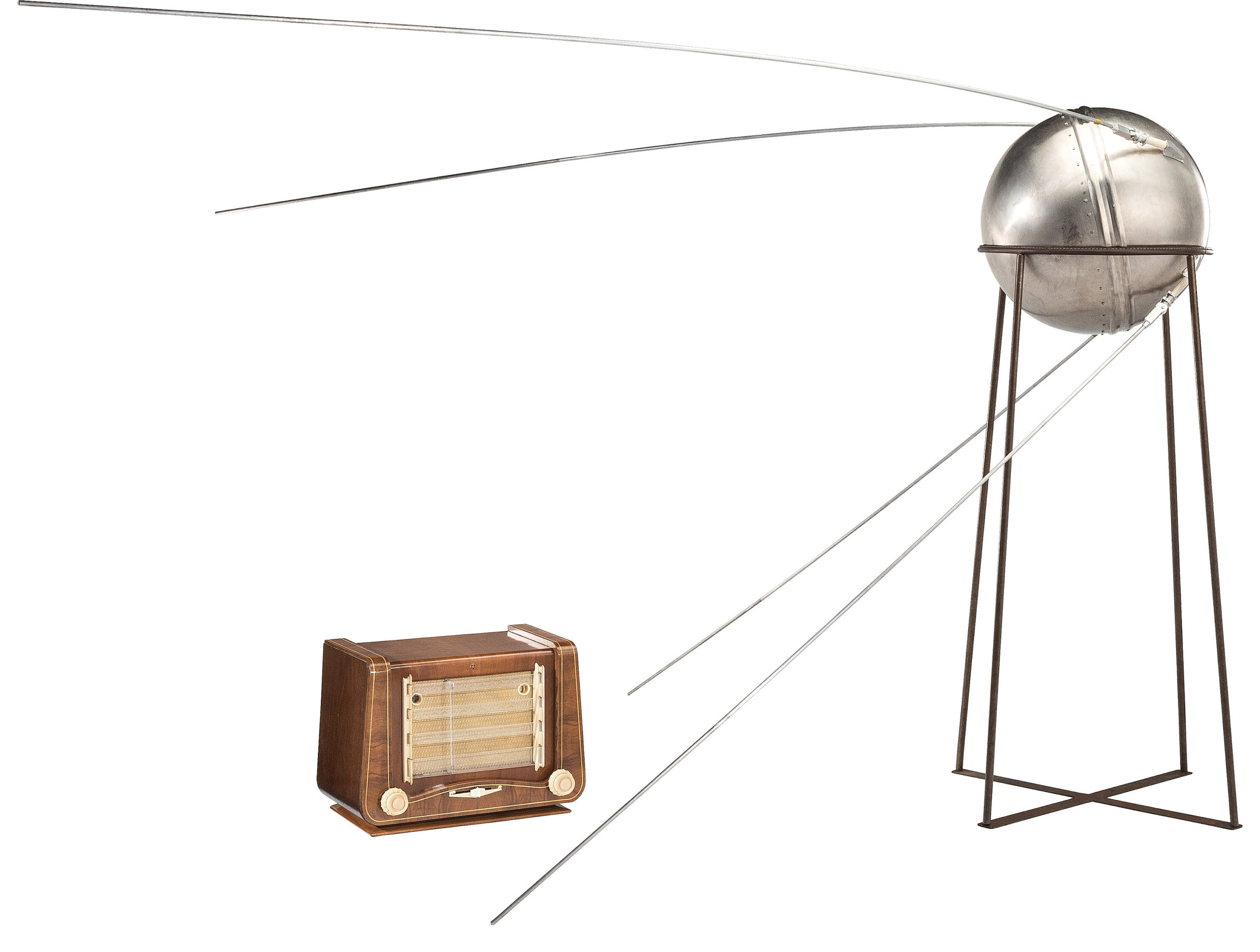
Heritage’s bidders launched this full-scale Sputnik lab model, complete with vintage Tesla broadcast receiver, to $375,000. It had provenance to “the father of modern rocketry,” Dr Frank J. Malina.
Review by Madelia Hickman Ring, Photos Courtesy Heritage Auctions
DALLAS – Collectors, connoisseurs and curators of political and historical objects found much to admire and pursue when Heritage Auctions conducted a few sales the week after Thanksgiving. Texana was first on deck on November 30, a boutique sale of less than 100 lots of maps, documents and books all connected with the history of the Lone Star State, an auction that roped in $355,500. The following day, in its Historical Platinum Session Signature Auction on December 1, a similarly small and select grouping of historical objects, photographs, books, manuscripts and other objects crossed the block, tallying a $2,483,888 net. Rounding out offerings December 3-4 and contributing another $628,628 to the week was about 250 lots of all things Presidential Christmas-themed pieces, from the Seeley Family collection.
Texana Signature Auction
If it happened in Texas and was historical, there is a chance it might cross the block at Heritage, under the watchful eye of Sandra Palomino, director of Historic Texana and expert in Civil War and Militaria, historical autographs and manuscripts. Palomino said it was a smaller sale than previous Texana auctions, noting, “It is hard to find good collections; most Texana collectors don’t sell, they leave them to their families and then things go into institutions.”
The majority of the top sellers in the sale were from a single collector, who was not identified by name.
Stabbing out a lead at $47,500 with three bidders in play was a one-page pay order dated March 10, 1829, and written and signed by James Bowie, ordering L. Hughes to pay Angus McNeill $134. McNeill (1806-1882) first met Jim Bowie in 1826 while he was a planter in Natchez, Miss., where Bowie first made a name for himself as a knife fighter during the 1827 Vidalia Sandbar Fight. The two men soon became friends as well as business associates. Eighteen months after that infamous fight, Bowie had this order drawn up. The framed document was unusual because not only are items signed by James Bowie extremely uncommon, but this example had a large signature and ornate flourish, or paraph. Bowie’s death at the Alamo on March 6, 1836, ensured his place among the pantheon of Texas heroes.
Another Texan who died at the Alamo was David “Davy” Crockett and a partial promissory note from Crockett to William Tucker, written in 1834 while Crockett was serving as a United States Representative from Tennessee, found redemption at $23,750. Tucker was the father of Crockett’s close friend and business associate, Enoch Tucker. Enoch was elected with “Davy” as a commissioner of Lawrenceburg, Tenn., in 1819 and the two men co-owned a large tract of land together until Crockett moved from the area in 1823. The document is recorded in James Atkins Shackford’s definitive biography, David Crockett: The Man and the Legend.
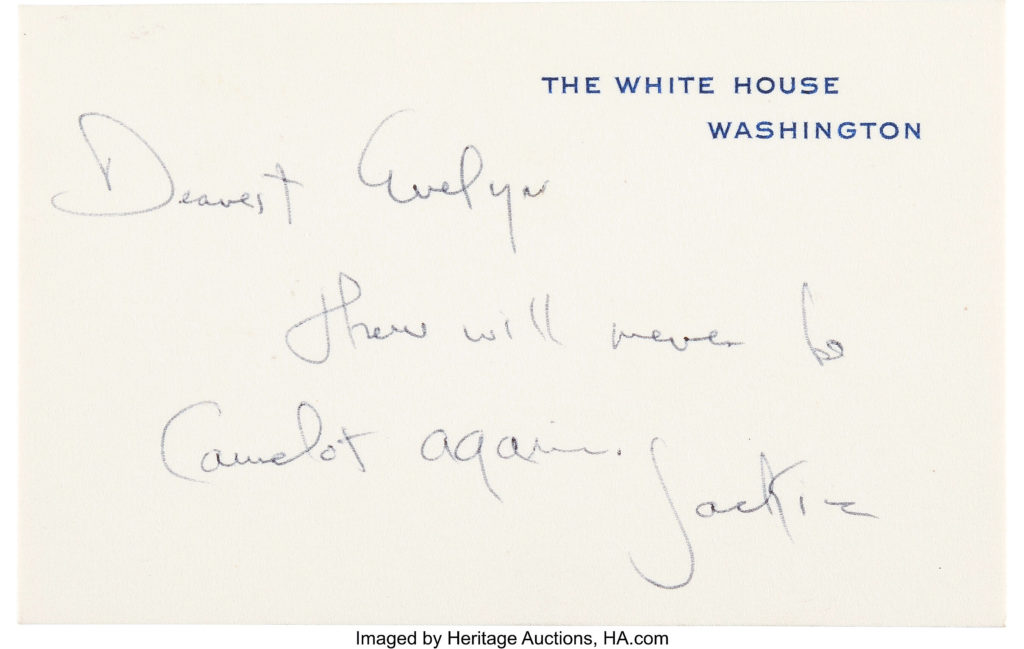
The top lot in the Seeley Family collection auction was a note written by Jacqueline Kennedy on White House stationery to JFK’s personal secretary,
Evelyn Lincoln, which read, simply, “Dearest Evelyn, There will never
be Camelot again, Jackie.” It rose to $106,250.
Early maps of Texas are always popular and sought-after by collectors and two examples earned the second and third place spots in the Texana sale. In second place at $31,250 was Jacob de Cordova’s Map of the State of Texas, which featured hand-coloring and a desirable large format that denoted the counties, cities and towns, roads and rivers in Texas. It was a later edition of the original, which was first issued in 1849. Revised by German cartographer Charles W. Pressler for the Colton Company at least four times (1856, 1857, 1858 and 1861), each new edition or issue was adjusted to include the continuing changes in Texas development. The format generally remained the same over the years. The catalog entry for the lot includes a publication citation that stated: “Sam Houston delivered a speech praising the map [the 1849 edition] on the floor of the U.S. Senate…that it was ‘the most correct and authentic map of Texas ever compiled.'”
Following right behind at $28,125 was John Disturnell’s “Mapa de los Estados Unidos de Mejico. Segun lo organizado y definido por las varias actas del Con- greso de dicha Republica: y construido por las mejores autoridades.” Disturnell’s second edition, the large hand-colored Spanish issue of Disturnell’s famous and significant map of Mexico, Texas and portions of the United States featured an engraved vignette of an eagle of Liberty adjacent to the title and three insets: “Tabla de Distancias,” “Tabla Estadistica,” and “Carta de los Caminos &c Desde Vera Cruz y Alvarado a Mejico.” This edition was historically significant as it was issued following the outbreak of the conflict when demand for accurate maps of the area raised exponentially. According to one citation, Robert E. Lee was in possession of one of the 1846 editions “and commented upon it in January 1848 when he was assisting Trist in determining whether San Diego was in Upper California or Lower California.” Disturnell’s editions remain among the most significant Texana maps of the Nineteenth Century.
Earning $18,750 was a second edition folio of John Arrowsmith’s The London Atlas of Universal Geography. Exhibiting the Physical & Political Divisions of the Various Countries of the World, Constructed from Original Materials. It was unpaginated but had 50 numbered maps, 15 unnumbered maps and 65 double-page hand-colored maps in outline.
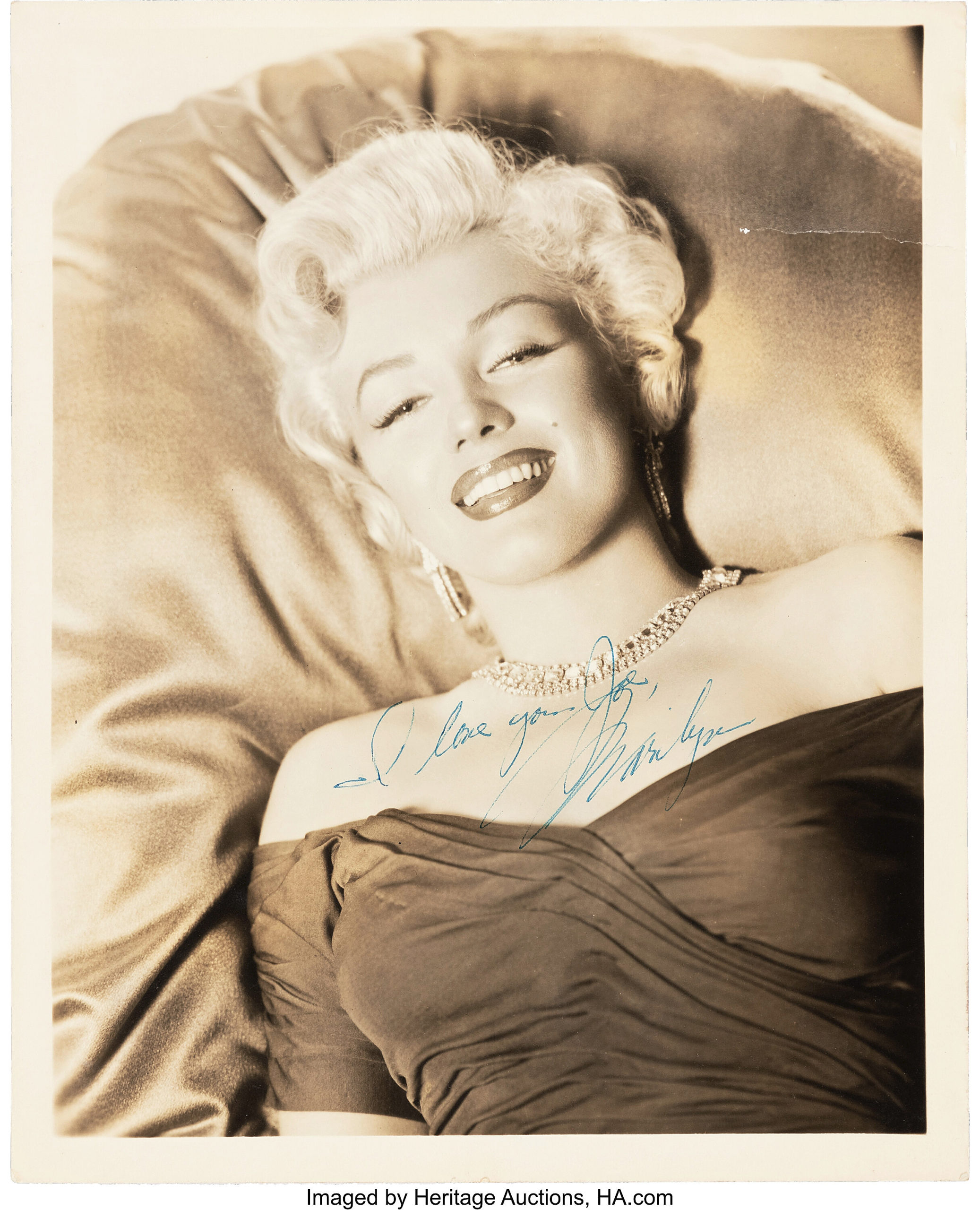
The only known photograph of Marilyn Monroe to be inscribed to Joe DiMaggio hit a home run with bidders, earning $300,000 and setting a new world auction record for a photograph signed by Monroe. It was the second highest price in the Historical Platinum Session.
Historical Platinum Session Auction
A decidedly different tone was struck when about 75 lots of more broadly focused historical objects came up December 1 in one of the firm’s newest sales, its twice a year Historical Platinum Signature auction that intentionally showcases “the best of the best,” as described by executive vice president, Joe Maddalena.
“Bidding was extraordinary from the moment the auction began, with heated battles among collectors over some of the most significant artifacts Heritage has ever had the privilege of bringing to market,” Maddalena said.
Earning a first place at $375,000 was a full-scale Sputnik-1 EMC/EMI lab model with original vintage Tesla Maj 620A broadcast receiver. The model is believed to be one of perhaps just four examples made by the OKB-1 (now Energia) lab in 1957 to test ground Electromagnetic Compatibility (EMC) and Electromagnetic Interference (EMI); two examples currently reside in museums, one being at the Energia Corporate Museum outside Moscow, and another at the Museum of Flight in Seattle, Wash. It had been owned by Dr Frank J. Malina, who NASA referred to as “considered by some to be the father of modern rocketry;” the catalog noted that Malina acquired the model on offer as a gift during the 1960s.
The second place lot in Heritage’s Historical Platinum Session sale had more earthbound star power: the only known inscribed photograph of Marilyn Monroe to Joe DiMaggio, which achieved $300,000 and set a new auction record for a signed photograph of Monroe. The 1953 studio photograph taken for Monroe’s breakout film, Gentlemen Prefer Blondes, Monroe signed it, simply, “I love you Joe, Marilyn.” Though the glamorous couple was married for just nine months, in 1954, they rekindled their romance after Monroe divorced Arthur Miller in 1955. The photograph had been in the DiMaggio family collection and accompanied by letters from DiMaggio’s daughters.
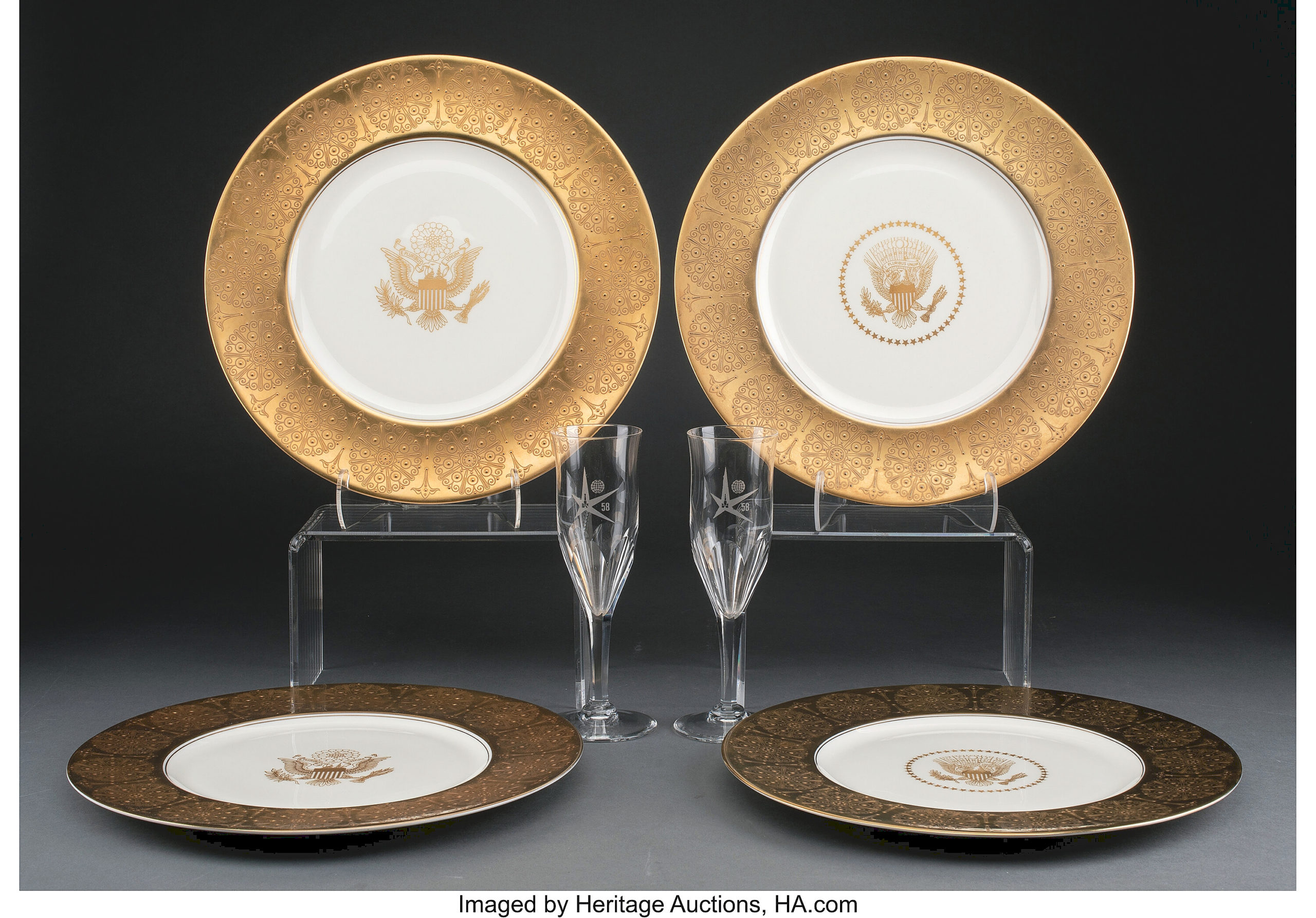
This group of plates and champagne flutes were connected with the 1958 Brussels World’s Fair and Dwight D. Eisenhower. Bidders topped the lot off at $8,125.
A letter sent by then-Secretary of State Thomas Jefferson to an unrecorded recipient that originally accompanied four copies of laws passed by the Second Congress concerning coinage, the US Mint and US representatives abroad was described in the catalog as “a fascinating representation of the many early acts passed by Congress as they attempted to establish the young country on a firm footing.” Though the addressee of the missive is not known, its language, notably the use of the phrase “your Excellency,” suggests it may have been sent to one of the state governors. Considering these factors, perhaps a third-place finish at $225,000 is not surprising. Interestingly, an act signed by Jefferson while he was still Secretary of State authorizing the creation of the first copper coinage was also sold in the sale; it achieved $175,000.
Sharing that $225,000 result – and showing a behind-the-scenes glimpse at the rules and conditions upon which “The Father of Texas” Stephen F. Austin was authorized to establish the Austin colony – was a hand-written circa 1825 two-page document. The ten conditions spelled out include the provisions that each of the 500 families allowed must be Catholic, must not be criminals and must be organized into a militia. Within a year, immigration to the Austin Colony had increased dramatically, establishing the first Anglo American colony in Texas.
As a condition issue, bullet holes can be a detriment to value. That was decidedly not the case with a page from the folded 50-page speech (and eyeglasses case) that President Theodore Roosevelt carried in his breast pocket before his October 14, 1912, Bull Moose campaign appearance in Milwaukee, Wisc., which slowed an assassin’s bullet and saved his life. Despite being shot, Roosevelt went ahead with his speech, where he spoke for more than an hour. One of only a few pages from this historic speech have ever been auctioned, so when Heritage offered page six, replete with bullet holes, it was not too surprising that it shot to $106,250.
Two objects connected with World War II also scored high results. The first was a printed first page of the “Instrument of Surrender,” proclaiming the unconditional surrender of the Japanese armed forces to the Allied powers that was signed by both Harry S. Truman and Douglas MacArthur and brought $87,500. The other was a large silk map of Japan, owned by technical sergeant George Caron, which was aboard the B-29 Enola Gay during the mission that dropped the “Little Boy” atomic bomb over Hiroshima. Measuring 32¾ by 30½ inches, it achieved $68,750, a sizeable increase over the $5,378 it made when Heritage sold it June 8, 2010.
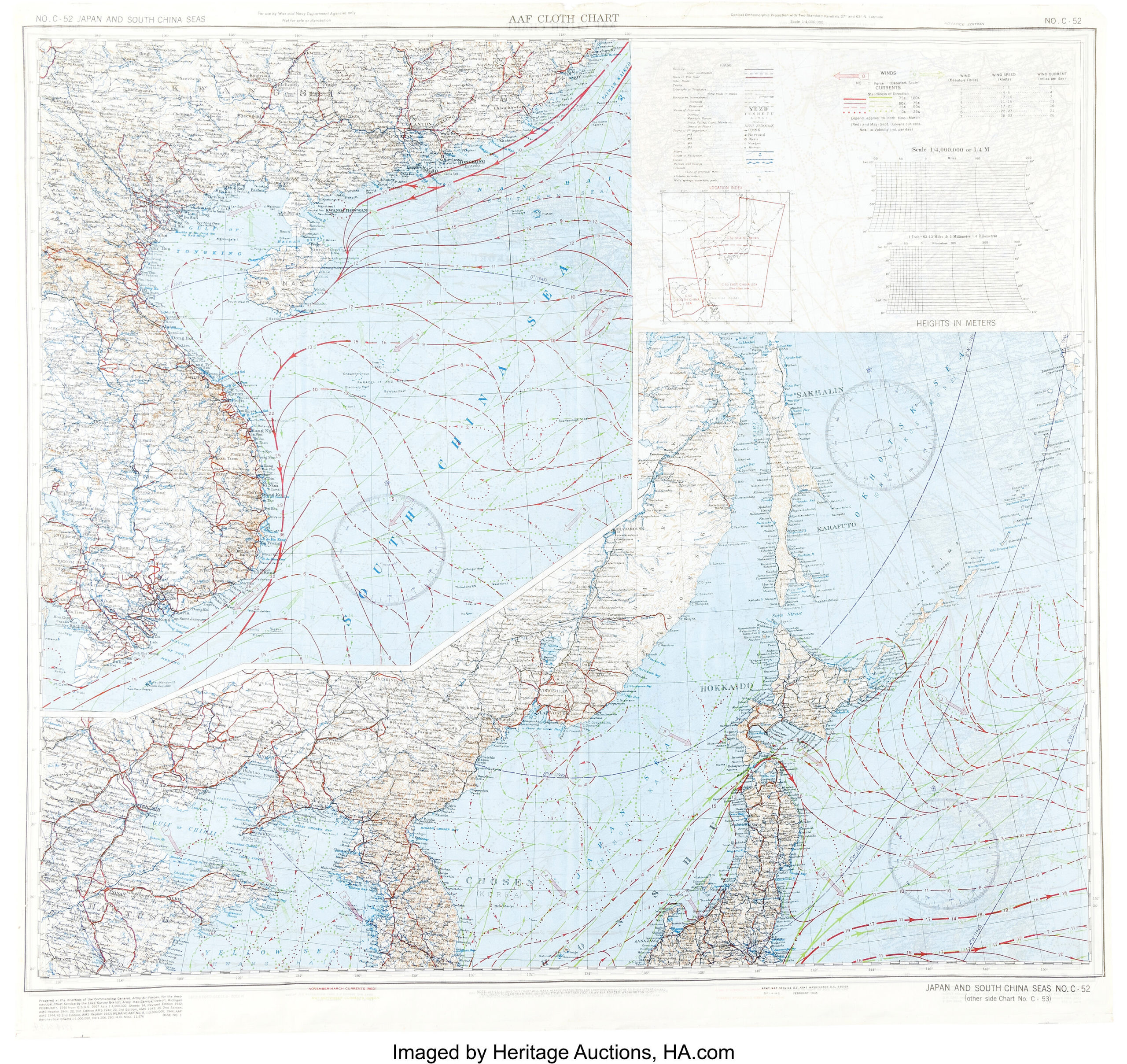
This silk map of Japan, owned by B-29 Enola Gay technical sergeant, George Caron, and flown during the mission that dropped the “Little Boy” atomic bomb on Hiroshima, Japan, on August 6, 1945, had been previously handled by Heritage Auctions in 2010, when it sold for $5,378. In this sale, bidders pushed it well past that, to $68,750.
Seeley Family Presidential Christmas Collection Americana & Political
Rounding out historical offerings December 3-4 was the Christmas Presidential collection of Ron and Mary Seeley – he an ophthalmologist, she a historian – whose collection focused on Presidential memorabilia and artifacts with a Christmas theme. Curtis Lindner, Heritage Auctions’ director of Americana and political memorabilia, was effusive in his enthusiasm for the results.
“It was a tremendous sale, with many items selling well above estimates. We thought it was a great success. It brought in a lot of new bidders as well as many of our usual ones [for this material].”
Evelyn Lincoln was personal secretary to President John F. Kennedy from his election to US Senate in 1953, until November 1963, and was even present in the Presidential motorcade when he was assassinated. A card she received from Jacqueline Kennedy after JFK’s assassination, which read simply, “Dearest Evelyn, There will never be Camelot again, Jackie,” mentioned the romanticized and defining idealization of the Kennedy administration. It was the top lot in the auction of the Seeley’s collection and earned $106,250.
Other Kennedy ephemera in the Seeley’s collection that made good money was a limited edition presentation copy of the Inaugural Addresses of the Presidents of the United States, from George Washington 1789 to John F. Kennedy 1961. Inscribed and signed by Jacqueline Kennedy, it is one of just 85 copies printed that were given as gifts to select members of the White House cabinet and staff. It was given to JFK’s special assistant, Ralph A. Dungan, in December 1963, after Kennedy’s assassination and made $13,750, only slightly ahead of the $13,125 achieved by a 1963 White House Christmas card signed by both the President and First Lady. The card was one of only a few made that bore the sentiment, “With best wishes for a Happy New Year,” and did not include “Blessed Christmas,” which was incorporated into the text of most of the Kennedy’s Christmas cards that year. It was signed and mailed prior to his assassination and its existence was unknown prior to 1985.
A presentation copy of Franklin D. Roosevelt’s D-Day Prayer, one of 100 bound, was inscribed, signed and given by FDR to his Secretary of War, Henry L. Stimson, at Christmas 1944. Noteworthy for being the last wartime White House Christmas book, it fetched $25,000.
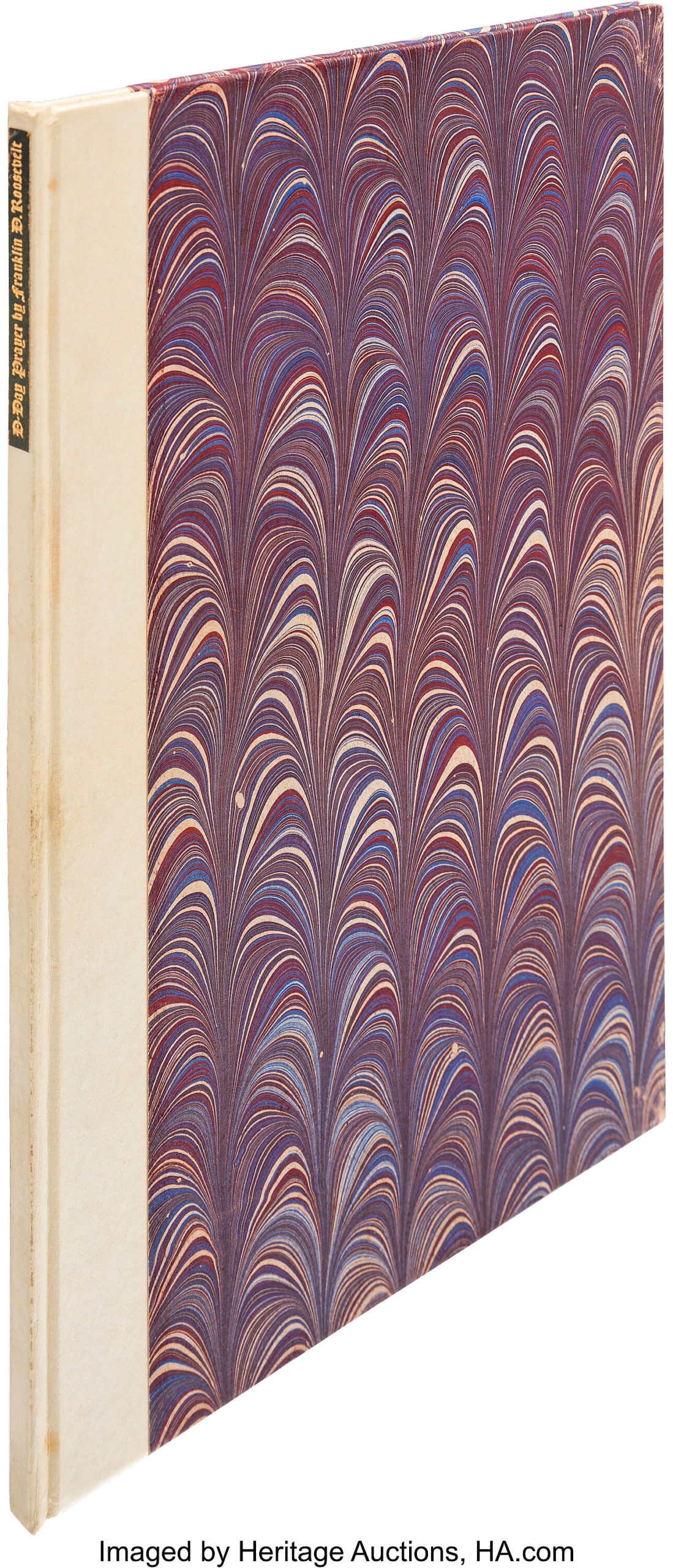
The second highest result in the Seeley Family sale at $25,000 was this limited edition copy of FDR’s D-Day Prayer, which he gave to his Secretary of War, Henry L. Stimson, at Christmas in 1944.
Earning $15,000 was a presentation copy of the Addresses of Franklin D. Roosevelt and Winston Churchill, one of 100 copies, which was given as a Christmas present in 1942 by FDR to Toi Bachelder, his primary secretary from 1933 to 1945; he gave them as gifts exclusively to his closest friends, family and select members of the White House staff. Not only is the volume the first wartime White House Christmas book to contain major war addresses but one of just a few that have come to auction in the past 40 years.
An extraordinary 1863 Christmas Eve dispatch from Abraham Lincoln requesting the release of two Confederate POW’s during Christmas was noted as revealing the compassion of Lincoln’s presidency at Christmas time during the height of the Civil War finished at $11,250.
The sale featured nearly 40 lots of presidential china; the category was led at $20,000 by a 10½-inch diameter white porcelain marked “Nast à Paris” on the underside. It was part of a table service of French porcelain, which was purchased in Paris in 1806 and was used by the Madisons in their home in Washington during the time he was Secretary of State. The services he ordered during his presidency were not rescued by First Lady Dolley Madison when the British burned the President’s House in 1814 and are presumed lost, as were services from the Adams and Jefferson administrations. According to the auction catalog, it is one of just 29 pieces of porcelain associated with Madison, making it exceptionally rare.
A group lot from the Eisenhower administration topped off at $8,125. The lot included two 1958 Brussels World’s Fair Castleton service plates measuring 11½ inches with the Great Seal of the United States and inscribed on the backs, “Castleton Studios/ For The/ United States Commissioner General/ Brussels World’s Fair, 1958,” were accompanied two 1955 Castleton White House service plates of the same size with the Presidential Seal were marked, “Castleton Studios/ The White House/ November 1955.” Two 1958 Brussels World’s Fair champagne flutes made by Val St Lambert were also part of the lot.
Rounding out the highest prices for Presidential china at $7,188 was a 200th Anniversary service place ordered from Lenox in 2000 by First Lady Hillary Clinton. It is part of a 12-piece place setting that would serve 300 guests.
Prices quoted include the buyer’s premium. For information, www.ha.com or 214-409-1425.
























